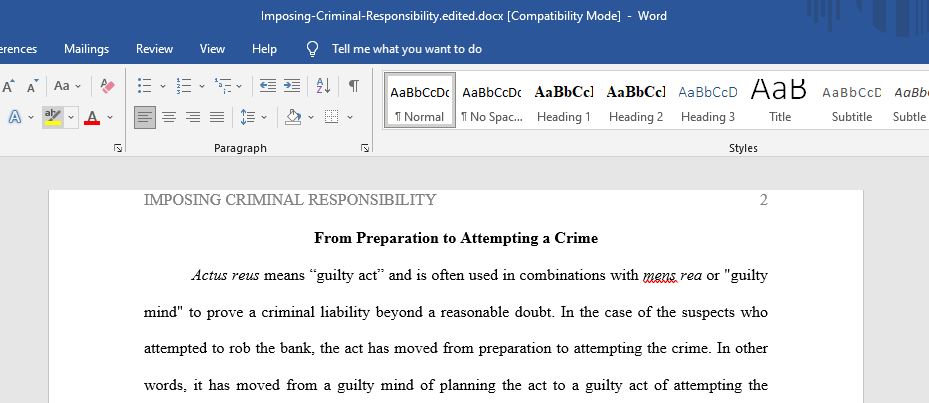Imposing Criminal Responsibility
Your text indicates that one of the most difficult problems in imposing criminal responsibility for the crime of attempt is determining when a suspect has crossed the line from mere preparation or planning of a crime to “attempting” the crime and sets forth various tests used to determine when the actus reus of attempt has been committed. Review the following factual scenarios and then describe whether you believe the actus reus has occurred under the Physical Proximity Test and the Substantial Step Test and why or why not.
A. Unknown suspects had successfully robbed tellers at various banks in Metropolis and in order to catch the suspects, police officers set up surveillance at similar banks in the area. While doing so one afternoon, officers see and vehicle they believe to be casing several banks. They follow the vehicle and see the operator exit the vehicle and enter a store and while doing so, he clips a scanner onto his belt. The scanner later proved to be tuned to the frequency that would receive Metropolis uniform patrol transmissions. Shortly thereafter, the driver parked the vehicle at the rear of one of the banks. Just prior to doing so, he had driven past the front of the bank and briefly parked in the rear of it. He got out of the car and quickly walked beside the bank toward the front door. He was wearing a black floor-length jacket while driving and when he walked toward the bank, he added a black-knit stocking cap pulled down to the top of his sunglasses, black gloves and a red eyepatch. In addition, his collar was turned up. His right hand was in his pocket and his left hand was in front of his face and he was ducking his head. When he reached the bank, he had his left hand in his jacket and with his right hand attempted to open the door, but the bank had just closed and the door was locked. When he realized the bank was closed and he could not enter, he ran past the bank window with his left hand covering his face to his vehicle. Police stopped his shortly thereafter and recovered a loaded handgun, the cap, gloves and the sunglasses. He initially gave a false name and was then charged with Attempted Robbery.
B. John Green meets with Joe Blue and asks him if he knows April Jones and could locate her. Blue says he will try and find her. Green and Blue meet several weeks later and Green tells Blue that Jones owes him money and he intends to kidnap her and rape her as a result of her refusing to pay Green the money owed to him. At that meeting, Green lays out a plan to kidnap her and asks Blue to drive because Green Greensn’t have a car and Blue agrees to do so. Unbeknownst to Green, Blue was actually an informant and reported Green’s plans to the police. Green and Blue had several additional conversations in which the plans were again discussed. Eventually, Green advised Blue he had located Jones and she was working that night and the two agreed to kidnap her that evening. Green and Blue agreed to meet at a restaurant and Blue notified the police who fitted him with a “body wire” to record the conversations. The two met at the restaurant and Green advised that Jones was working as a “go-go” dancer at a club approximately ½ hour away. Blue suggested he could lure Jones out to his car by offering her some cocaine and Green had with him a drug called “Rush”, a set of handcuffs made from rope, a rubber ball, and a pocket knife and told Blue that he would be ready in the back seat and would put the ball in her mouth and hurt her on the head. The two then left the restaurant and headed towards Blue’s car. As Green was about to climb into the back seat, the police arrested him.
1. Your text discusses the defense of “Impossibility”. What specific type of impossibility defense could be applicable in the first scenario? Is it a valid defense in this case? Why or why not.
Answer preview:
Word: 400

